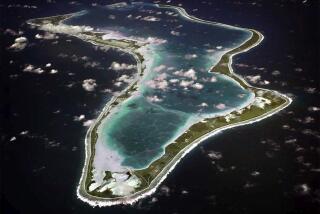AFTERMATH OF THE TOWER REPORT : Britain OKs Missile Sale for Contras : ‘Blowpipe’ Weapons Would Be Nation’s First Aid to Rebels
- Share via
WASHINGTON — Prime Minister Margaret Thatcher’s government has given preliminary approval to the sale of British-made “Blowpipe” anti-aircraft missiles for use by the Nicaraguan rebels, knowledgeable sources said Friday.
The sale, which stems partly from an earlier deal negotiated by fired White House aide Oliver L. North and retired Maj. Gen. Richard V. Secord, would mark the first known British sale of weapons to aid the contras , U.S. officials said.
At least 150 of the four-foot-long missiles and 30 shoulder-held launchers would be included in the sale, which still must be approved by the CIA, the sources said. The agency would pay for the missiles from the $100-million U.S. aid fund for the contras, they said. The price for the missiles could not be determined.
Used Against Helicopters
The contras want the Blowpipe, an anti-aircraft missile with a range of four miles, to shoot down the Sandinista government’s Soviet-supplied attack helicopters.
“It’s an ideal anti-aircraft weapon for the contras,” one source said. “It’s even better, for them, than the Stinger,” the sophisticated U.S.-made, shoulder-held missile that the CIA has furnished to rebels in Afghanistan and Angola.
Contra leader Adolfo Calero confirmed that his army was hoping to obtain Blowpipes, but said the deal had not been concluded. “We have not gotten any,” he said recently.
“We have the basic approval of the British government,” another source said. “It’s up to the agency (CIA) to approve it now.”
None Sold to North
In London, the British government said it had sold no Blowpipes to North or Secord, but declined to comment on the report that it was prepared to sell the missiles to the CIA for the contras’ use.
The contras have been attempting to obtain the Blowpipe since at least March, 1986, according to National Security Council documents released this week by the Tower Commission on the Iranian arms scandal.
“We are trying to find a way to get 10 Blowpipe launchers and 20 missiles from (a South American country whose name was deleted from the report) through the Short Bros. representative,” North wrote to former National Security Adviser Robert C. McFarlane on March 26, 1986. “Short Bros., the manufacturer of the Blowpipe, is willing to arrange the deal, conduct the training and even send U.K. ‘tech reps’ (British technical representatives) if we can close the arrangement. Dick Secord has already paid 10% down on the delivery and we have a (country deleted) end user certificate which is acceptable to (the South American country).”
It could not be immediately determined which South American country had agreed to sell the missiles to Secord. Argentina, Chile and Ecuador all use Blowpipes for air defense, according to the International Institute for Strategic Studies.
Obtained Certificates
Such a sale would normally have required both an “end user certificate” from another government, certifying that it was going to use the missiles for its armed forces, and a re-export license from the British. Secord and the contras frequently obtained end user certificates from the governments of Guatemala and Honduras.
The South American deal apparently foundered when the British government refused to issue a license for the Blowpipes’ resale. The British Ministry of Defense said Friday: “We issued no such license in the context as mentioned in the Tower Commission report.”
North appears to have proposed that President Reagan write to Prime Minister Thatcher to seek a reversal of the decision, according to the commission report.
In a memorandum to then-National Security Adviser John M. Poindexter in June, North said: “We should look to going back to the head of an allied government on the blowpipes if we are going to do anything at all about outside support (for the contras) in the next few days, and I (would) love to carry the letter from RR.”
No Strong Stand on Contras
Thatcher’s government has taken no strong stand on the issue of Nicaragua, although the prime minister has given general support to President Reagan’s avowed goal of opposing Soviet-sponsored regimes around the world.
Contra officials have said they want the Blowpipe as a portable, easy-to-use defense against the Soviets’ MI-8 and MI-24 helicopters, which have become the Sandinista government’s most effective weapons against the guerrillas.
The rebels initially wanted the U.S.-made Stinger. But Congress, fearful that the Stingers could fall into the hands of terrorists, indicated that it would block any such sale.
Some contra officers, moreover, argued that the simpler Blowpipe was more suited to their guerrilla troops than the complex Stinger. The contras have been using Soviet-made SAM-7 anti-aircraft missiles, but they have proven difficult to maintain in tropical humidity, they said.
Nevertheless, contra officials reported shooting down a Sandinista helicopter on Friday with an SAM-7.
In Belfast, Northern Ireland, a spokesman for Short Bros. said: “We make no comment at all on who is or is not a customer for our missiles. We don’t discuss it.”
Staff writer Tyler Marshall in London contributed to this story.
More to Read
Sign up for Essential California
The most important California stories and recommendations in your inbox every morning.
You may occasionally receive promotional content from the Los Angeles Times.











